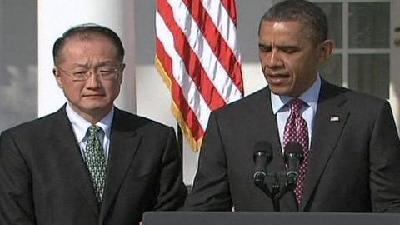
President Obama has nominated Dartmouth College President Jim Yong Kim to be the next World Bank president. Since 1944, an American citizen has always led the institution. But with the growing strength of emerging economies, more countries want to influence how the World Bank does business.
Dr. Kim is one of three candidates for the World Bank presidency. He's a doctor and former World Health Organization official. The others are Nigerian Finance Minister Ngozi Okonjo-Iweala and former Colombian finance minister Jose Antonio Ocampo.
However, Fredrik Erixon says the American is the runaway favorite for the post. Erixon is director of the Brussels-based European Center for International Political Economy.
"I think it's already close to a done deal that the White House nominee will take up the post simply because the United States and Europe are probably going to agree on him being the candidate. And that means that he's going to win. But I think that he, like the other two candidates, should be asked to present what they'd like to do with the World Bank. And they should in particular be asked how they want to reform the World Bank to revitalize its role for economic development," he said.
Political pressures?
Erixon also said this being a presidential election year it's very unlikely anyone but an American would become World Bank president.
"(The) United States would have been keen to get an American to head up the World Bank even if it would not have been an election year in the United States. But this year of course they're going to be even keener to make sure that he is going to win. Because otherwise President Obama will be accused by Republicans of being soft on foreign policy or soft on defending United States interests abroad or a president that only leads from behind," he said.
He says the next World Bank leader may face more pressure than past bank presidents.
"We are now at a time when lots of developing countries in the world have continued to increase economic growth at a time when the United States, Europe and other older economic powers, so to speak, have declined. And of course this has again continued to reinforce the larger trend of developing countries being much more influential in global economic policies these days," said Erixon.
And, he said, they want that influence to extend to the World Bank.
"Now what we're seeing is lots of developing countries that are asking for a change in the selection process when the World Bank and the International Monetary Fund are going to elect new leaders," he said.
In fact, there was evidence of that last year when Dominique Strauss-Kahn resigned as leader of the IMF amid a sex scandal. He was replaced by Christine Lagarde, the former French finance minister.
Emerging economies
The head of the European Center for International Political Economy likens the situation to the rise in influence of G20 nations in relation to the G8.
"Developing countries today represent such a big part of the world economy – that means every time that world leaders need to get together in order to flesh out new policies these countries also need to be at the table. If you look, for instance, at economic growth in 2012, 75 percent of world economic growth is going to come outside "the old West"—to use that phrase," he said.
The growth has occurred in both Asian and African countries.
Erixon said, "Having a good understanding about the particular predicaments of developing countries will be even more important in the future than it has been in the past. Because whoever is going to lead the institution, they're going to be challenged by a landscape of developing countries, which differ from each other much more than they did in the past. What we've seen in the past 10 years is extremely rapid economic development in some countries, while we have seen very poor economic development in other countries."
Erixon says developing countries will probably call on the next World Bank president to streamline credit and loan procedures and to make the bank less bureaucratic.
"The second thing," he said, "is to find a good balance between the fast rising countries in East Asia and in some parts of Africa and countries that have not jumped on the band wagon of high economic growth yet. And these types of countries are going to need entirely different help from the World Bank. And finding that balance is going to be a difficult one, but it's a critical one."
The successor to outgoing president Robert Zoellick is expected to be announced in time for the World Bank's spring meeting. It begins April 20th.
predicament: a situation, especially an unpleasant, troublesome, or trying one, from which extrication is difficult 困境
Spending by govt may boost economy
EU officials urge tighter fiscal rules for euro countries
Who should be the next chief of the IMF?
(来源:VOA 编辑:崔旭燕)
